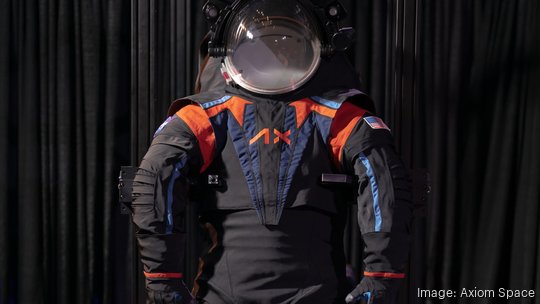
Ahead of NASA’s return to the moon, two space companies with a Houston presence landed contracts from the space agency.
Houston-based Axiom Space secured an initial $5 million commitment that could grow to $142 million over four years to modify its Artemis III lunar spacesuit design for spacewalking from the International Space Station.
Meanwhile, Charlotte, North Carolina-based Collins Aerospace, a division of Virginia-based Raytheon Technologies Corp. (NYSE: RTX), landed a $5 million contract to modify its own spacesuit design for operating on the moon.
Both contracts are coming out of NASA’s Extravehicular Activity Services, or xEVAS, contract, which has a combined $3.5 billion on offer for spacewalking needs through 2034, according to the agency’s website.
For Axiom, the task order follows its $228.5 million contract to produce the Axiom Extravehicular Mobility Unit, or AxEMU, suit for the Artemis III mission. Axiom revealed the design, which can be used on the lunar surface, in March 2023.
Both Collins and Axiom were previously selected for other xEVAS task awards, and the terms of the contract allow both companies to own the technology they develop and use it for non-NASA applications, according to an agency press release from 2022.
The Artemis III mission is planned for 2025, according to NASA’s website, and will be the first manned mission to the moon in over 50 years. The mission will explore the region near the moon’s south pole, using an Orion spacecraft to bring the crew to the moon.
In addition to Axiom and Collins, California-based SpaceX has already been tapped to provide its Starship lunar lander for the astronauts to land on the moon’s surface and to perform research tasks, NASA said.
The contract awards follow Axiom’s successful Axiom Mission 2 to the ISS in June. The mission crew included two Saudi members as part of a partnership with the Kingdom of Saudi Arabia’s Saudi Space Agency.
Meanwhile, Collins opened its 120,000-square-foot Houston Spaceport facility in late 2022. In addition to spacesuit-testing services, the building also includes a 10,000-square-foot incubator space that the company said would mainly be controlled by the city of Houston for collaboration opportunities between universities and tech startups.
Like Collins, Axiom is another anchor tenant at the Spaceport and is working on its new 22-acre headquarters after breaking ground in 2022. In the new building, the company will train astronauts and develop its planned commercial space station, the Axiom Station. While the headquarters are under construction, Axiom leased a 146,000-square-foot facility at a former Fry’s Electronics building in Webster.
Axiom CEO Michael Suffredini previously remarked on the potential of Houston to be a staging area for a growing low-Earth-orbit economy within the next decade. Commercial spaceflight could be used as a way to tap into tourism, research and manufacturing.
Texas is a hotbed for spaceflight activity, according to a February 2023 report from accounting firm PricewaterhouseCoopers. The presence of two Federal Aviation Administration-licensed spaceports, including the Houston Spaceport, as well as companies such as Axiom, Collins, SpaceX and Jeff Bezos’ Blue Origin contributed to the Lone Star State outperforming its closest competitors, Georgia and North Carolina.





